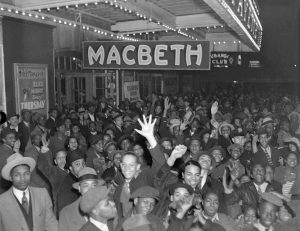The Supreme Gun Lobby Makes Us Afraid To Even Defend The Gun Laws We Have
If we ask the Supreme Court for help, they'll likely make everything worse.
 “I am in blood stepped in so far that should I wade no more, Returning were as tedious as go o’er.”
“I am in blood stepped in so far that should I wade no more, Returning were as tedious as go o’er.”
— Macbeth
Some people think that 59 (and counting) dead country music fans will inspire this country to re-examine its gun laws, just as some people thought that dead schoolchildren at Sandy Hook Elementary would inspire action.

Trust The Process: How To Build And Manage Workflows In Law Firms
It will not. The gun lobby, Republicans in Congress, and conservatives on the courts have made their peace with the mass murder of American citizens as the price of their ambitions. Like Macbeth, they are in so deep with their rationalizations that freedom requires turning a blind eye to gun violence; they no longer have the strength and will to turn back. There will be no “rethink.” They cannot pull back.
Forward — towards an ever more deregulated state of armament — is the only likely outcome from the tragedy in Las Vegas. Any chance for near-term gun regulation died when the country allowed Mitch McConnell to steal a Supreme Court seat and hand it to the Federalist Society and the Heritage Foundation. Now back at full conservative strength, the Supreme Court is more likely to continue dismantling what gun regulation we have than to do anything to help Americans protect themselves from crazy people who want to bear arms.
It’s that reality that has D.C. Attorney General Karl A. Racine in a bind. We have gun laws on the books, and those laws are not being strengthened. Instead, they are under direct attack by gun-toting forces.
The District of Columbia has restrictions on who can obtain a concealed-carry permit. Essentially, you have to have a “good reason” to need one. Needing a reason to carry a concealed weapon in public sounds like basic wisdom, but to Second Amendment activists it sounds like tyranny or something. The D.C. Circuit struck down the district’s regulation over the summer.
Sponsored

How Savvy Lawyers Build Their Law Firm Rate Sheet

Trust The Process: How To Build And Manage Workflows In Law Firms

Not All Legal AI Is Created Equal


Not All Legal AI Is Created Equal

Now, Racine has the choice to appeal the decision to the Supreme Court. But smart people on the side of gun control don’t want him to do it. Why? Well because if the Supreme Court takes they case, they are as likely as not to blow apart any attempt to regulate conceal carry permits in this fashion. Such a decision, which would probably be 5-4 (even assuming Anthony Kennedy stays on the Court and Ruth Bader Ginsburg stays alive), could crush similar gun laws in states like New York and California.
Merely asking the Supreme Court to consider upholding a gun regulation could lead to federally mandated deregulation across the nation.
It’s happened before. The Washington Post explains:
The dilemma mirrors the choice city officials faced in 2007, when the same appeals court found D.C.’s handgun ban unconstitutional. Led by former mayor Adrian M. Fenty (D), the city took the case, District of Columbia v. Heller, to the high court — prompting a landmark decision that established for the first time that the Second Amendment guarantees an individual right to bear arms separate from military service.
That history looms large as D.C. elected officials weigh the risks of asking the Supreme Court to review the current law, which severely limits licenses to carry concealed weapons in the nation’s capital by requiring applicants to show a “good reason to fear injury.” If the justices decide to hear the case, similar restrictions in states including California, New York, Maryland, Massachusetts, Hawaii, New Jersey and Connecticut will hang in the balance.
The people with guns are dangerous. The people who support the people with guns are dangerous. It is too dangerous to show up to the Supreme Court armed with only your arguments about “states’ rights” to limit access to weapons in your own town. The Court will shoot holes into your entire regulatory regime, then congratulate itself for defending your freedom to die.
Sponsored

A Law Firm Checklist For Successful Transaction Management


How To Build And Manage Your Law Firm Rate Sheet
The gun lobby will never be vanquished, till Birnam wood come to Dunsinane.
D.C. weighs gun law appeal, with fate of restrictions nationwide in the balance [Washington Post]







